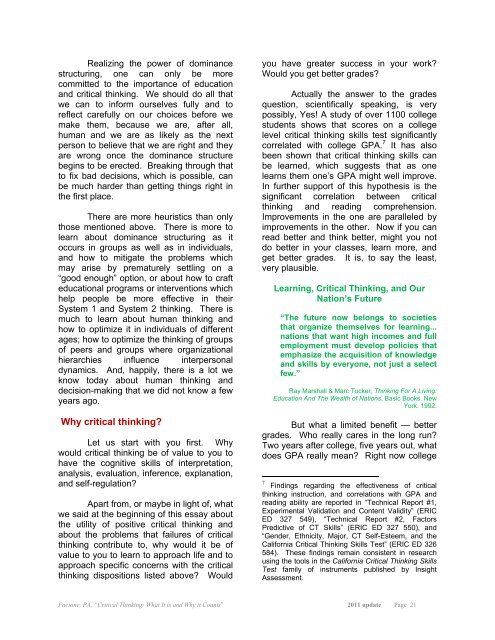Interpreting The Facts
Interpreting The Facts
Interpreting The Facts
You also want an ePaper? Increase the reach of your titles
YUMPU automatically turns print PDFs into web optimized ePapers that Google loves.
Realizing the power of dominance<br />
structuring, one can only be more<br />
committed to the importance of education<br />
and critical thinking. We should do all that<br />
we can to inform ourselves fully and to<br />
reflect carefully on our choices before we<br />
make them, because we are, after all,<br />
human and we are as likely as the next<br />
person to believe that we are right and they<br />
are wrong once the dominance structure<br />
begins to be erected. Breaking through that<br />
to fix bad decisions, which is possible, can<br />
be much harder than getting things right in<br />
the first place.<br />
<strong>The</strong>re are more heuristics than only<br />
those mentioned above. <strong>The</strong>re is more to<br />
learn about dominance structuring as it<br />
occurs in groups as well as in individuals,<br />
and how to mitigate the problems which<br />
may arise by prematurely settling on a<br />
“good enough” option, or about how to craft<br />
educational programs or interventions which<br />
help people be more effective in their<br />
System 1 and System 2 thinking. <strong>The</strong>re is<br />
much to learn about human thinking and<br />
how to optimize it in individuals of different<br />
ages; how to optimize the thinking of groups<br />
of peers and groups where organizational<br />
hierarchies influence interpersonal<br />
dynamics. And, happily, there is a lot we<br />
know today about human thinking and<br />
decision-making that we did not know a few<br />
years ago.<br />
Why critical thinking?<br />
Let us start with you first. Why<br />
would critical thinking be of value to you to<br />
have the cognitive skills of interpretation,<br />
analysis, evaluation, inference, explanation,<br />
and self-regulation?<br />
Apart from, or maybe in light of, what<br />
we said at the beginning of this essay about<br />
the utility of positive critical thinking and<br />
about the problems that failures of critical<br />
thinking contribute to, why would it be of<br />
value to you to learn to approach life and to<br />
approach specific concerns with the critical<br />
thinking dispositions listed above? Would<br />
you have greater success in your work?<br />
Would you get better grades?<br />
Actually the answer to the grades<br />
question, scientifically speaking, is very<br />
possibly, Yes! A study of over 1100 college<br />
students shows that scores on a college<br />
level critical thinking skills test significantly<br />
correlated with college GPA. 7 It has also<br />
been shown that critical thinking skills can<br />
be learned, which suggests that as one<br />
learns them one’s GPA might well improve.<br />
In further support of this hypothesis is the<br />
significant correlation between critical<br />
thinking and reading comprehension.<br />
Improvements in the one are paralleled by<br />
improvements in the other. Now if you can<br />
read better and think better, might you not<br />
do better in your classes, learn more, and<br />
get better grades. It is, to say the least,<br />
very plausible.<br />
Learning, Critical Thinking, and Our<br />
Nation’s Future<br />
“<strong>The</strong> future now belongs to societies<br />
that organize themselves for learning...<br />
nations that want high incomes and full<br />
employment must develop policies that<br />
emphasize the acquisition of knowledge<br />
and skills by everyone, not just a select<br />
few.”<br />
Ray Marshall & Marc Tucker, Thinking For A Living:<br />
Education And <strong>The</strong> Wealth of Nations, Basic Books. New<br />
York. 1992.<br />
But what a limited benefit — better<br />
grades. Who really cares in the long run?<br />
Two years after college, five years out, what<br />
does GPA really mean? Right now college<br />
7<br />
Findings regarding the effectiveness of critical<br />
thinking instruction, and correlations with GPA and<br />
reading ability are reported in “Technical Report #1,<br />
Experimental Validation and Content Validity” (ERIC<br />
ED 327 549), “Technical Report #2, Factors<br />
Predictive of CT Skills” (ERIC ED 327 550), and<br />
“Gender, Ethnicity, Major, CT Self-Esteem, and the<br />
California Critical Thinking Skills Test” (ERIC ED 326<br />
584). <strong>The</strong>se findings remain consistent in research<br />
using the tools in the California Critical Thinking Skills<br />
Test family of instruments published by Insight<br />
Assessment.<br />
Facione, PA, “Critical Thinking: What It is and Why it Counts” 2011 update Page 21

















